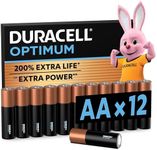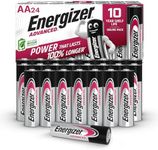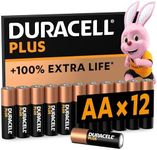Buying Guide for the Best Aa Batteries
When choosing AA batteries, it's important to consider the specific needs of the devices you plan to power. AA batteries come in various types and capacities, each suited for different applications. Understanding the key specifications will help you select the best batteries for your devices, ensuring optimal performance and longevity.Battery TypeAA batteries come in several types, including alkaline, lithium, and rechargeable (NiMH). Alkaline batteries are the most common and are suitable for low-drain devices like remote controls and clocks. Lithium batteries offer a longer lifespan and are ideal for high-drain devices such as digital cameras. Rechargeable NiMH batteries are cost-effective and environmentally friendly, perfect for devices that are used frequently. Choose the type based on how often you use the device and its power requirements.
Capacity (mAh)Capacity, measured in milliampere-hours (mAh), indicates how much energy a battery can store. Higher capacity batteries last longer between charges or replacements. For example, a 2000mAh battery will last longer than a 1000mAh battery in the same device. If you have high-drain devices or use them frequently, opt for batteries with higher capacity. For low-drain devices, a lower capacity may suffice.
Shelf LifeShelf life refers to how long a battery can be stored before it starts to lose its charge. Alkaline batteries typically have a shelf life of 5-10 years, while lithium batteries can last up to 20 years. If you plan to store batteries for emergencies or infrequent use, consider those with a longer shelf life to ensure they are ready when needed.
VoltageAA batteries generally have a voltage of 1.5V, but rechargeable NiMH batteries typically have a slightly lower voltage of 1.2V. Most devices are designed to handle this difference, but it's important to check your device's specifications to ensure compatibility. If your device requires a specific voltage, make sure to choose batteries that meet those requirements.
Environmental ImpactConsider the environmental impact of the batteries you choose. Rechargeable batteries are more environmentally friendly as they reduce waste and can be used multiple times. If you opt for disposable batteries, look for those that are labeled as environmentally safe or have recycling programs. Your choice can help reduce environmental harm and promote sustainability.















